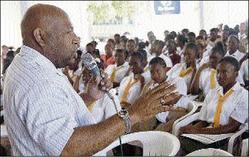Athaliah Reynolds, Staff Reporter

Godfrey Fisher, teacher at Kingston College, addresses students during the second day of The Gleaner's Youthlink CSEC exam techinique seminar at the Girl Guides Association headquarters at Waterloo Road, St Andrew. - Rudolph Brown/Chief Photographer
There is a greater need for Jamaican students to practise speaking Standard English regularly in order to be better able to write exams, argues Godfrey Fisher, a teacher at Kingston College.
Fisher, who has been a teacher for approximately 25 years, said he was not opposed to students speaking Patois or using certain slangs while interacting with their peers. However, he said there was a time and place for dialect.
"I can speak Patois and I know all the latest slangs used by young people today, but there is a time and place for it. It is important for you to practise speaking Standard English, especially while you are in school, so you are better able to write it when the time comes," Fisher told some 600 students who turned out yesterday for the second day of The Gleaner's Youthlink CSEC seminar at the Girl Guides Association headquarters at Waterloo Road, St Andrew.
Expression a big problem
Speaking with The Gleaner after the seminar, Fisher said most students were knowledgeable of the techniques required for passing exams, but were unable to express themselves properly when they were required to write Standard English.
"It's not that they lack knowledge. They know what a summary is or how to identify literary devices," he said. "The problem they have is just how to translate this knowledge into writing."
He added: "That's why I have always encouraged my students to read and speak English so they will be able to express themselves better in writing."
Viola Thompson, who teaches English literature at Holy Childhood High School, agrees that for students to do well in English, like any other language, they needed to practise. She said this was often a challenge as many students find it difficult to use Standard English when they are interacting with their peers or other individuals in their communities.
She said students often complain that they are ridiculed or criticised for speaking Standard English and so they have to break the habit when they get home.
Also of great concern for Thompson was the introduction of text messaging, instant messaging and emails, which she believes is seriously hampering students' language ability.
"Students will often replace certain words like 'you' with the letter 'u' in their essays because that is how they spell when texting their friends," she said.
"Half of my class yesterday was spent talking to them about the same issue," she told The Gleaner. "I find it quite bothersome because 'u' isn't a word, 'doin' isn't a word and you can't expect to pass an exam using those phrases," said Thompson.
However, Professor Hubert Devonish, head of the Department for Language, Linguistics and Philosophy at the University of West Indies, said that teachers should see this as an opportunity instead of a problem.
Prof Devonish said that in the past teachers were concerned that students were not reading or writing enough and now because of technology they are sending messages to their friends almost 50 times a day. This, he said, should be considered as a boom for literacy.
athaliah.reynolds@gleanerjm.com

